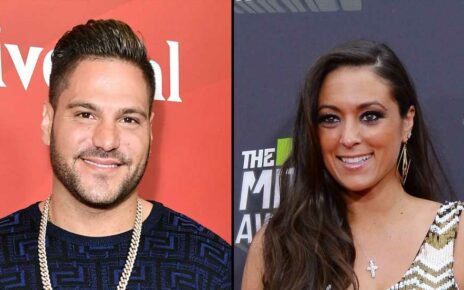There’s a thrilling moment a little before the halfway point of Amazon’s new limited series “Daisy Jones & the Six” in which two stars collide. The ethereal vocalist Daisy Jones (Riley Keough) has been invited to perform her collaboration with a rising rock band (no points for guessing their moniker), but crashes the stage a bit early and then refuses to leave after her one song has been performed. Daisy and the Six’s lead singer Billy (Sam Claflin) share the microphone for a while, if “share” is the word for what one does in a battle for territory; faces close together, they’re competing for real estate, competing for a claim on the song they sing, competing to be heard.
That rivalry is the essence of “Daisy Jones & the Six,” a flawed but compelling adaptation of Taylor Jenkins Reid’s 2019 novel of the same name. Reid has described her novel as “a Fleetwood Mac vibe,” if not precisely drawn from Fleetwood Mac’s story — and, as with the real-life Stevie Nicks and Lindsey Buckingham, the two musicians at the center of this fictional group generate as much drama as they do music. Unlike Fleetwood Mac, which continued to wring soapsuds out of their public narrative into the 21st century, Daisy Jones & the Six definitively break up in 1977, which we’re told at the start of this series; the war they fight after the struggle for control is one of defining the narrative. We hear the characters speak to us as if for a documentary (a device retained from the novel, which is written in oral-history style). As we watch Daisy, in the 1970s, stomp over the Six in an act of willful spotlight-seizing, we hear Daisy, in the 1990s, tell us that this was simply beyond her control. “They wouldn’t let me leave!,” she laughs, a fount of charismatic self-delusion.
Created by Scott Neustadter and Michael H. Weber and a production of Reese Witherspoon’s Hello Sunshine, this series presents a “Behind the Music” tale at 10 episodes’ length. Tied together by an act of producing genius and a benevolent disregard for personality dynamics, Daisy Jones and the band she hijacks make perfect tunes together, all while she and Billy circle one another, with an air of grudging mistrust both of one another and themselves. All of this is conveyed in an even, almost clinical, tone, perhaps fitting the fact that we’re being told this story by characters looking back with regret. There’s little of the swirling heedlessness of blossoming attraction here, even as characters grow ever more attracted to one another in the heated space of creative partnership. (The genuinely tuneful and lovely music they make was written for the show by Blake Mills.) Billy, anyway, is trying to keep himself from falling in love: At least notionally committed to the mother of his child (Camila Morrone), he has the misfortune of being professionally connected with someone we’re credibly informed is her generation’s most charismatic star. And Claflin, never more watchable than when he’s watching Daisy, sells the struggle nicely, so much so that the struggle catches our attention more than any sparks Daisy and Billy generate.
But then, she is primarily interested in herself — which is not to say she’s a narcissist, just someone who acknowledges she’s a born star. Daisy Jones, who choses a new name after a childhood of neglect, is a hell of a role, and Riley Keough grabs it with both hands. I had read Keough as preternaturally cold-blooded after her sharp turn in the superlative 2016 first season of “The Girlfriend Experience,” in which she radiates a low-affect contempt for the world around her; it was only her work as a shameless, living-out-loud grifter in the 2021 film “Zola” that her explosive quality as a performer, her ability to find an actual rhythm within madness, became clear. Both aspects of Keough come into play as Daisy blazes through the Six, with an impassioned sense of what she wants to achieve and an inability to acknowledge the obstacles in her way. (If it’s worth acknowledging the personal-history aspect of Keough’s casting — the granddaughter of Elvis Presley now playing a rock singer — it’s only to note how thoroughly Keough plays the role as herself, not as anyone’s descendant.)
Keough and, to an extent, Claflin are such magnetic presences that the rest of the cast get somewhat lost: You may find yourself wishing that Daisy’s backing band were the Three or Four, or you may just give up on tracking every individual member. Of the backing musicians, Suki Waterhouse is likely the standout, and Will Harrison, playing Billy’s brother who watches his onetime sibling act’s trajectory with dismay, gets a few choice moments. In all, though, the lack of texture in a big cast contributes to the whiff of antiseptic on what ought to be a wilder telling of this story. One also can feel certain cut corners, so much so that the lush and elaborate ‘70s rock atmosphere evaporates a bit: A scene in which Keough sings at a piano is carefully shot to exclude her hands from the frame, while the aging-up (by 20 years!) of the cast is little more elaborate than changing up their hair.
These can be pushed past: Keough, certainly, evolves her performance enough when switching from one timeline to the other — toggling from music-world hellion to elder stateswoman of rock — to bring the viewer along. Her character is so singular that one almost doesn’t notice that there’s not, frankly, that much story to “Daisy Jones & the Six.” Things happen — both in the careers of all the musicians concerned and in Daisy’s and Billy’s personal lives — but if the comparison point is Fleetwood Mac, these fictional characters’ stories seem surprisingly small and reticently told. (Perhaps this is the challenge: If one were to transpose the Stevie-and-Lindsey soap opera to fiction, it would seem too outsized, too grand.) Daisy’s personality is huge, but it’s not just the band over which she’s running roughshod — it’s the show. As a delivery system for two compelling performances, “Daisy Jones & the Six” is well worth watching. But I craved more moments in which it might really sing.
“Daisy Jones & the Six” will premiere its first three episodes on Friday, March 3, with new episodes launching every Friday through March 24, on Amazon Prime Video.
Read More About:
Source: Read Full Article


